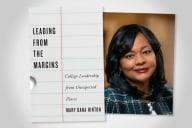You have /5 articles left.
Sign up for a free account or log in.
Add another chapter to the Hypatia: A Journal of Feminist Philosophy saga: the publication’s Board of Directors this week released a statement supporting Hypatia’s original decision to release a controversial article on race, viewed by some as an attack on transgender women or an erasure of black women, or both. In so doing, the board challenged an earlier statement by a majority of the journal’s associate editors saying the article never should have been published.
“The board stands behind the judgment of Hypatia’s editor, Sally Scholz,” reads the board’s guest post on Daily Nous, a major philosophy blog. Moreover, the associate editors’ statement “undermining the editorial decision was disseminated without adequate consultation with the editor.”
Editorial disputes in academic journals are rarely so public, but the paper in question generated widespread interest this spring for comparing Caitlyn Jenner’s identity as a woman to Rachel Dolezal’s identity as a black woman. (Dolezal, former head of the NAACP in Spokane, Wash., became a household name in 2015 after it was revealed she was white but had long presented herself as African-American.) The article’s author, Rebecca Tuvel, an assistant professor of philosophy at Rhodes College, essentially argued that society should be as accepting of the “transracial” identities people choose for themselves as it as of transgender people.
Tuvel’s idea is provocative -- something one might expect in a feminist philosophy journal -- but many critics said it reinforced false stereotypes that transgender people simply “choose” their identities. An open letter to Hypatia’s editors that accrued hundreds of signatures, for example, said that a “message has been sent, to authors and readers alike, that white [cisgender] scholars may engage in speculative discussion of these themes without broad and sustained engagement with those theorists whose lives are most directly affected by transphobia and racism.” Tuvel was also disparaged on social media, not just professionally but personally.
A majority of Hypatia’s associate editors soon released a public statement of apology enumerating the article’s “harms,” including “descriptions of trans lives that perpetuate harmful assumptions and (not coincidentally) ignore important scholarship by trans philosophers; the practice of deadnaming, in which a trans person’s name is accompanied by a reference to the name they were assigned at birth,” and “an insufficient engagement with the field of critical race theory.”
Clearly, the editors said, “the article should not have been published, and we believe that the fault for this lies in the review process.”
The controversy caught the attention of publications that love to hate on liberal academic “snowflakes,” but also those typically more sympathetic to issues of identity. New York magazine called it a “modern-day witch hunt,” for instance, as Hypatia’s editor publicly defended her decision to publish the piece and even referred it to the Committee on Publication Ethics. The forum helps peer-reviewed journal editors handle the grayer areas of publication.
The Board of Directors’ statement makes clear that that associate editors do not, and cannot, speak for Hypatia. Yet it gives some attention to their concerns, saying that “we acknowledge the history and continuation of injustices around matters of intersectionality, and know that many of us have much to learn from those who have lived in and worked on intersections of marginalized racial and gender identities.”
Over all, it says, Hypatia takes “the intensity of this controversy to be a testament to the importance of the issues that the journal discusses.”
Tuvel did not immediately respond to a request for comment.
Justin Weinberg, an associate professor of philosophy at the University of South Carolina and editor of Daily Nous, suggested that nail-biting over alleged censorship in the case was uncalled for, since “academic freedom is holding up well in this controversy.”
Despite the initial outcry about the paper on social media and “the intemperate response by some of the journal's associate editors, the paper has not been retracted,” he said, “and those responsible for its publication have on multiple occasions quite visibly endorsed the decision to publish.”
It seems that “most of the philosophers who have weighed in on the controversy believe that the statement from the associate editors was a serious and multifarious breach of professional norms,” though, he said.
One lingering problem, Weinberg said, is that some junior scholars have said they’re afraid to work on these issues going forward, as to not cause another “frenzy.” Yet “academic freedom does not include freedom from others expressing outrage about you or your work,” he added. “The prospect of angering others with your ideas may be scary to some, but plenty of careers have their scary parts, and it is not clear why we should think that the life of the mind should not require courage.”









